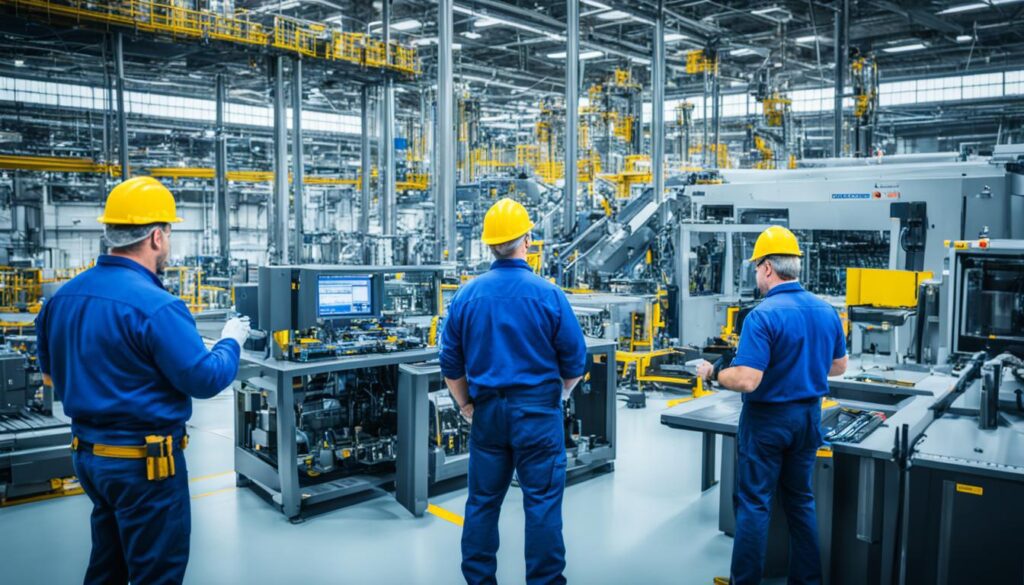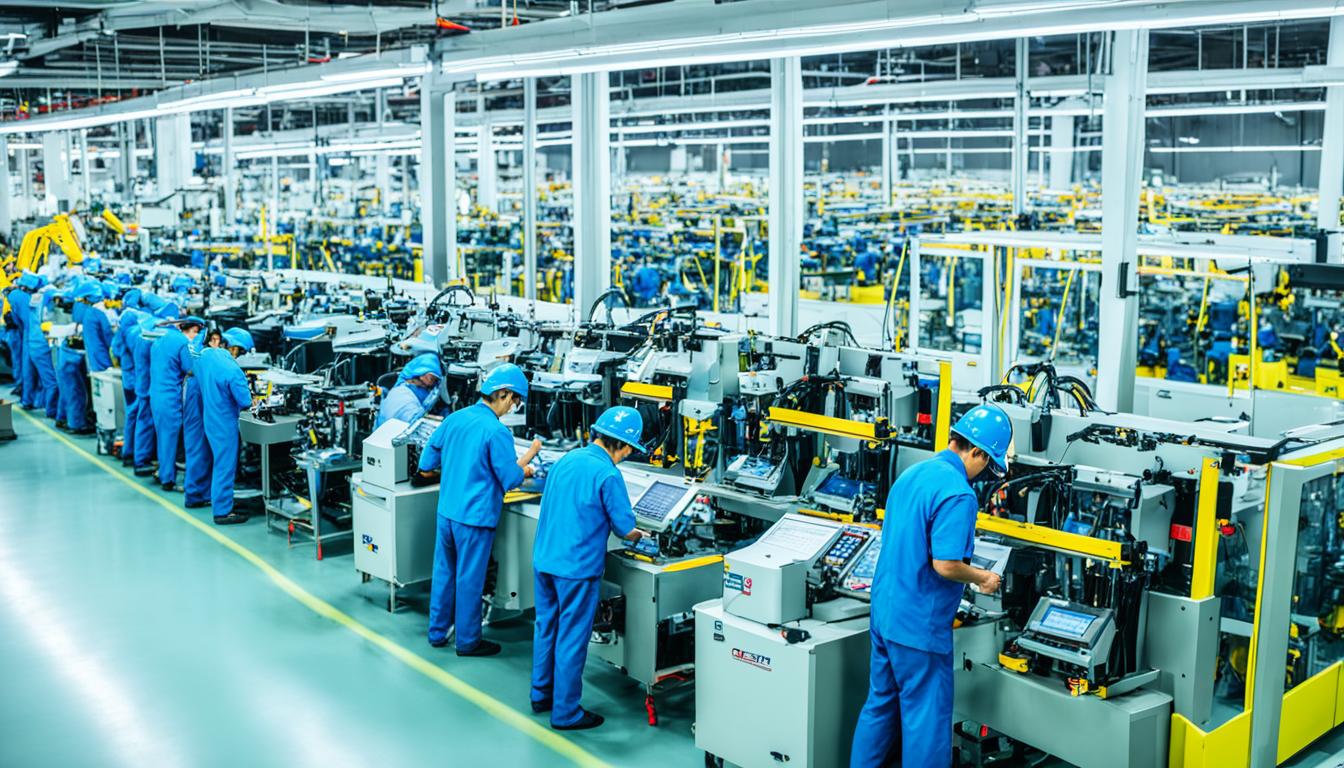Discover a range of work opportunities in manufacturing industry in Thailand and forge a promising career in a dynamic economic landscape.
Amidst a dynamically changing global industrial landscape, Thailand has successfully carved out a substantial niche for itself, emerging as a compelling hub for work opportunities in the manufacturing industry. While the world has been pivoting towards diversification, Thailand has garnered attention by offering a substantial volume of manufacturing jobs that cater to a range of skill sets. This growth stems not only from its strategic geographic positioning but also from a dedicated shift in strategy, as companies worldwide look to mitigate risks by distributing their production across multiple countries – a move known as the “China + 1” strategy.
Thailand’s attractive climate and robust economic performance have bolstered this trend, opening up a wealth of manufacturing career possibilities in Thailand. Significant infrastructural developments and Thailand’s role as a central player in Asia’s economy have helped create a fertile landscape for both local and foreign talent, leading to a growing interest in manufacturing employment in Thailand.
Key Takeaways
- Thailand’s strategic “China + 1” strategy adoption creates diverse work opportunities in the manufacturing industry in Thailand.
- The country’s manufacturing sector is thriving, promising a variety of manufacturing jobs in Thailand for skilled workers.
- With its strategic position in Asia and growing economic influence, Thailand offers lucrative manufacturing career opportunities.
- Extensive infrastructure developments are continuously enhancing manufacturing employment prospects in Thailand.
- Thailand’s growth trajectory in the manufacturing sector is fueled by international trade shifts and a strong export presence.
- The country’s manufacturing industry welcomes both local and expatriate professionals, offering a dynamic and diverse workplace.
- Thailand’s policies and initiatives are designed to attract and retain skilled labor in its burgeoning manufacturing marketplace.
Overview of Thailand’s Manufacturing Sector
The manufacturing job market in Thailand is a vibrant and significant component of the nation’s economy. Thriving on innovation, technological advancements, and with a strong export presence, the sector contributes robustly to the country’s GDP. Among the myriad of manufacturing divisions, the technology, automotive, and rubber industries stand out as the pillars of the Thai manufacturing landscape. As such, job vacancies in the manufacturing industry Thailand has seen a considerable uptick, presenting a myriad of opportunities for skilled workers and professionals.
International giants such as Toyota and Honda have taken note of Thailand’s manufacturing prowess, choosing it as a strategic base for their operations. This has not only escalated the reputation of Thailand’s automotive industry but also broadened the scope for employment within the sector. Similarly, the nation’s command over rubber exports forms the backbone of various other manufacturing industries, amplifying the expansiveness of manufacturing companies hiring in Thailand.
With economic indicators showing an upward trajectory, the trend in job creation continues to burgeon. The following table highlights some of the key sectors and the opportunities they present within the realm of Thailand’s manufacturing industry:
| Sector | Percentage of GDP | Notable Companies | Job Vacancies |
|---|---|---|---|
| Technology (Computer & HDD) | 15% | Seagate, Western Digital | Rising |
| Automotive | 12% | Toyota, Honda | Increase Noted |
| Rubber Exports | Varies | Bridgestone, Michelin | Steady Demand |
Given the scope and diversity within Thailand’s manufacturing job market, prospective job seekers have a plethora of roles to select from. Be it in operational capacities, engineering, design, or even management, the manufacturing landscape in Thailand is ripe with potential. With aggressive economic expansion and innovation at its core, the manufacturing sector promises to be a keystone in the future of work in Thailand.
Thailand continues to pave the way for manufacturing excellence in Asia, offering abundant opportunities for enthusiastic professionals eager to forge a vibrant career path.
Top Export Products and Economic Growth in Thailand
Thailand shines as a beacon of industrial progress within Asia, carving a unique niche with its diverse range of export products. These top-tier commodities play a fundamental role in catapulting the nation’s economic status while simultaneously generating an array of manufacturing career opportunities in Thailand. At the intersection of innovation and tradition, the manufacturing sector emerges as a bastion of employment, brimming with manufacturing industry recruitment in Thailand.
Thailand’s Position in Asian Economy
Within the competitive landscape of Asia’s economy, Thailand holds a commanding presence. Notably, its advancements in tech manufacturing, such as computers and optical readers, have set the stage for an upsurge in skilled labor demand. These sectors underscore the country’s economic prowess and attract foreign investment, bolstering the manufacturing job scene in profound ways.
Major Manufacturing Outputs
Thailand’s economic narrative is underscored by a wealth of major manufacturing outputs, shaping a future oriented towards growth and sustainability. From electronics to agro-products, these industries broaden the horizon for entrepreneurs and job seekers alike, eager to tap into Thailand’s economic vitality.
Automotive Industry’s Contribution
The automotive sector revs up Thailand’s economic engine, with heavyweight international automakers entrenched in the local manufacturing landscape. Companies such as Toyota and Honda not only underpin the industrial matrix but also amplify job creation, driving the development of new skills and technology transfer.
Thailand’s Rubber Export and Its Impact
The ripple effects of Thailand’s dominance as the leading exporter of natural rubber are felt throughout the global economy. This accolade transcends the boundaries of trade by powering an ecosystem that supports an extensive network of rubber tire manufacturing, presenting numerous employment opportunities and nurturing a robust recruitment network.

Infrastructure Developments in Thailand’s Manufacturing Landscape
The manufacturing job market in Thailand has entered a dynamic phase, stimulated by advancements in the nation’s infrastructure. Ranked 71st worldwide, Thailand is embracing significant growth and scalability opportunities. These efforts not only boost the local economy but also open new possibilities for those searching for manufacturing jobs in Thailand, particularly for foreigners. An infrastructure blueprint, driven by developmental plans and strategic governmental investments, is unfolding and aims to revolutionize how Thailand connects with the global market.
Current Ranking and Comparisons
Thailand has made impressive strides in comparison to its global counterparts in terms of infrastructure development. This growth is vital for supporting the manufacturing landscape and plays a crucial role in appealing to international entities and professionals interested in the manufacturing job market in Thailand. Benchmarking against regional standards, Thailand is poised to leapfrog in infrastructure rankings, which is likely to escalate the nation’s manufacturing competencies and job opportunities alike.
Governmental Investments and Projects
Government-funded projects are the bedrock of infrastructure enhancements in Thailand, particularly with respect to the manufacturing industry. Large-scale investments earmarked for transportation, energy, and digital innovations are well-aligned with Thailand’s vision to elevate its standing as a manufacturing hub. The Eastern Economic Corridor (EEC) initiative is a testament to this vision, wielding considerable influence on the influx of manufacturing jobs in Thailand for foreigners.
Connecting to Global Supply Chains
Strengthened by the EEC initiative, Thailand is fast-tracking its integration into global supply chains, fostering a more interconnected manufacturing community. These upgraded infrastructures form the arteries of trade and commerce, ensuring that Thailand remains a competitive player on the international stage. For individuals seeking to be part of Thailand’s evolving manufacturing industry, this connectivity signals robust job prospects and a solid footing in a burgeoning job market.

Work Opportunities in Manufacturing Industry in Thailand
In an era of technological innovation and economic restructuring, Thailand emerges as a beaming destination for manufacturing jobs. As the country advances under the Thailand 4.0 initiative, the labor market evolves, gravitating toward an era of heightened skill and expertise. This transition marks a shift from traditional labor-intensive manufacturing to high-tech and advanced manufacturing domains. Distinct from its regional counterparts, Thailand’s competitive minimum wage remains an enticing factor for both employers and job seekers in the manufacturing job market in Thailand.
However, the burgeoning market does not solely focus on remuneration. The Thai manufacturing industry recognizes the imperative of addressing the multifaceted needs of its workforce. Financial concerns, a universal stressor among employees, are being ingeniously tackled by entities like Salary Hero. Their pioneering ‘Salary on Demand’ service is illustrative of the innovative strides being taken to empower employees. Such initiatives underline a commitment to promoting financial ease and enhancing the overall quality of life for those pursuing work opportunities in the manufacturing industry in Thailand.
As a result, the environment within the manufacturing sector is increasingly stable and appealing, fostering employee loyalty and a sense of satisfaction. This is pivotal for sustaining a skilled workforce and resonates strongly with those seeking rewarding employment. Thailand’s manufacturing industry is undeniably poised for growth, and for the discerning job seeker, it represents a landscape abundant with opportunities and poised for personal and professional fulfillment.
FAQ
What are the current work opportunities in Thailand’s manufacturing industry?
Thailand’s manufacturing industry offers a range of work opportunities, particularly in high growth sectors such as automotive, electronics, and rubber production. Foreigners with specialized skills may also find opportunities as the country continues to connect with global supply chains and drive economic expansion.
How significant is the manufacturing sector to Thailand’s economy?
Manufacturing is a cornerstone of Thailand’s economy, reflected in its major outputs and contributions to GDP. Thailand excels in several manufacturing sectors, including automotive and electronics, attracting both local and international investments.
What job vacancies are available in the manufacturing industry in Thailand?
Job vacancies in Thailand’s manufacturing industry range from entry-level positions to skilled jobs in engineering, management, research and development, quality control, and supply chain management. The demand for skilled labor is growing, thanks to technological advancements and increased productivity.
Which manufacturing companies are currently hiring in Thailand?
Various multinational and local manufacturing companies are hiring in Thailand, including major international automakers, electronics companies, and rubber manufacturing firms. Prospective candidates can find job listings on company websites, job board portals, and through industry recruitment services.
What are Thailand’s key export products and their impact on the economy?
Thailand’s top export products include computers, electronic parts, and automotive components. The country’s economic growth has been bolstered by the strong performance of these exports, making the manufacturing sector a lucrative field for career advancement.
What is the role of the automotive industry in Thailand?
The automotive industry plays a vital role in Thailand’s economy, with a strong presence of international companies and being responsible for a substantial share of the country’s exports. There are significant career opportunities in this sector due to ongoing investments and expansions.
How has Thailand’s dominant position in rubber exports shaped its manufacturing industry?
Thailand’s leadership in rubber exports has had a profound effect on manufacturing sectors related to automotive production, specifically in terms of tire manufacturing. This has created demand for specialized labor and new production methods in the industry.
Where does Thailand’s infrastructure rank globally, and how does this affect manufacturing opportunities?
Thailand’s infrastructure is currently ranked 71st globally, and ongoing improvements are set to enhance transportation and logistics capabilities. This, in turn, is expected to create a more conducive environment for manufacturing operations and job opportunities, particularly in regions like the Eastern Economic Corridor.
What impact will government investments and new projects have on manufacturing jobs?
Government investments in infrastructure and development projects like the Eastern Economic Corridor are expected to modernize Thailand’s manufacturing landscape, enhance connectivity, and consequently create a wealth of job opportunities in the sector, particularly for engineering and technical skills.
Can foreigners find manufacturing jobs in Thailand, and what are the opportunities?
Yes, manufacturing jobs in Thailand for foreigners are available, especially for those with technical expertise and experience in the manufacturing sector. With the country’s strategic initiatives to boost skilled manufacturing, foreigners have good prospects, especially if they can offer expertise that is in short supply locally.
How is the manufacturing job market evolving in Thailand?
Thailand’s manufacturing job market is evolving towards more advanced, high-value production, driving demand for skilled workers with technical proficiency, as part of the Thailand 4.0 initiative. This progression is paving the way for a promising career trajectory in various fields of manufacturing.
Are there any initiatives to support employee financial well-being in the manufacturing industry?
Initiatives such as Salary Hero’s “Salary on Demand” service are emerging to support financial health among manufacturing industry workers in Thailand. These services aim to reduce financial stress and promote well-being, making the sector more appealing to both current and prospective employees.






Leave a reply